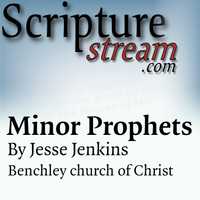-
Micah 1-7
-
Introduction
-
Micah means “who is like Jehovah.”
-
Micah was contemporary with Isaiah, which we can see by comparing the kings mentioned in both books.
-
Micah primarily prophesied to the poor and downtrodden, from about 735 B.C.
-
-
God’s judgment on Samaria and Judah with a ray of hope for salvation for a remnant (Micah 1-3)
- Micah 3:2 – Truth is the most hated thing in the world!
-
Messianic hope (Micah 4-5)
-
Micah 4:1-3 – Compare Isaiah 2:2-4.
-
Micah 4:3-5 – God’s kingdom would be peaceful, not defended with carnal weapons. II Corinthians 10:4-5
-
Micah 4:4 – Christians have more power than Satan. We can resist him!
-
Micah 5:2 – Jesus would come out of Bethlehem and be eternal (deity – see John 1:1).
-
Micah 5:7-9 – We should be as dew from the Lord, like showers on the grass. This is referring to the positive influence the righteous should have on those around them.
-
Micah 5:8 – See Proverbs 28:1. The righteous will be bold like a lion, standing in truth. II Corinthians 10:4-5.
-
-
God has a controversy with Israel (Micah 6)
-
Micah 6:1-5 – Israel had no gratitude for God’s blessings.
-
Micah 6:6-8 – It is possible to do the right things in worship and still not be saved. God wants a right life, not ritual.
-
-
Penitent prays and the divine promise (Micah 7)
-
Micah 7:1-6 – Confession of the people’s guilt.
-
Micah 7:14 – Prayer for God’s blessings.
-
Micah 7:15 – God would show them marvelous things!
-
Micah 7:16 – Nations will be confounded at the might of the righteous. Proverbs 28:1; II Corinthians 10:4-5
-
Micah 7:18-20 – God delights in mercy and will pardon iniquity. Hebrews 8:12
-
-
Lessons for us:
-
God requires us to live righteously. We must be merciful and walk humbly with God.
-
The holiness of God and righteousness of God must be stressed today.
-
Ritualistic keeping of commandments is not sufficient for salvation.
-
-
Next up: Zephaniah
JJ
November 04, 2020
For further study, see also:
Questions or comments? Join our Discord server for further study.
